Mises, Ludwig von. Human Action: A Treatise on Economics
Подождите немного. Документ загружается.

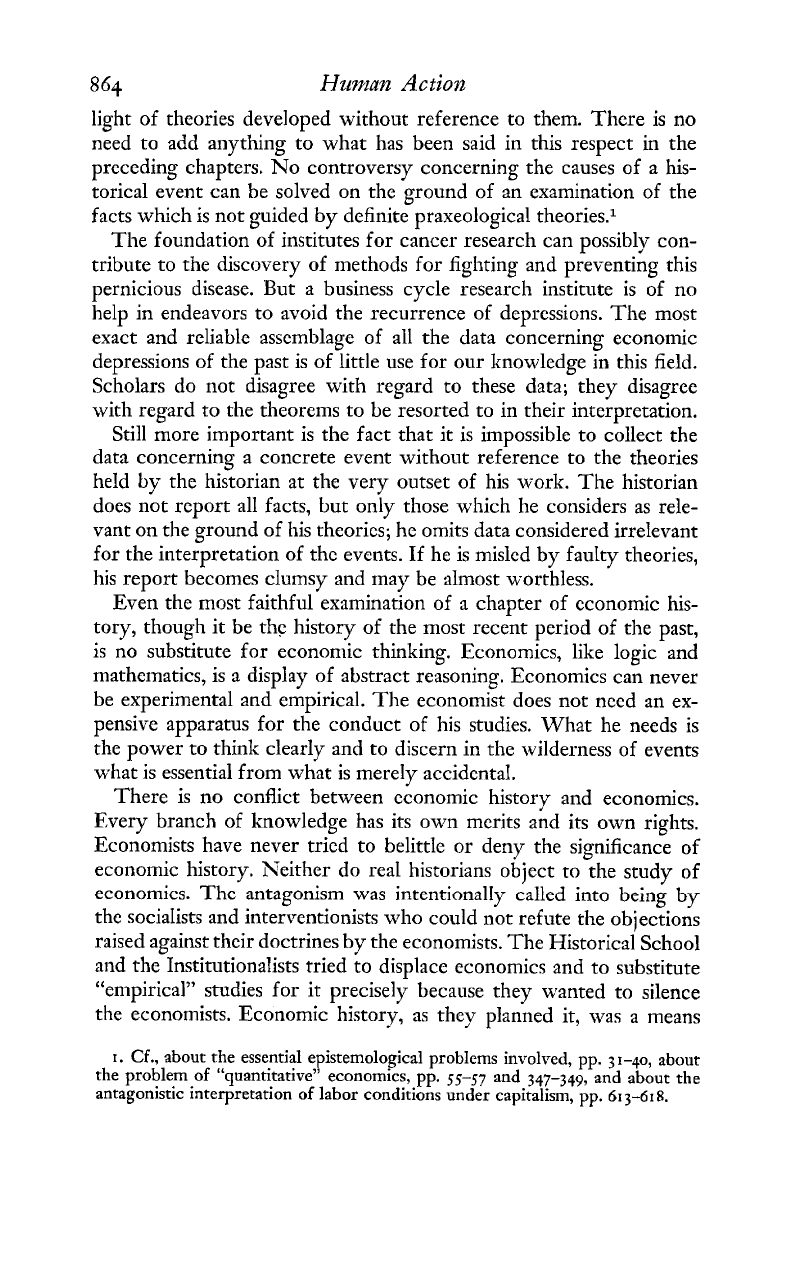
864
Hzman
Action
light of theories developed without reference to them. There is no
need to add anything to what has been said in this respect in the
preceding chapters. No controversy concerning the causes of a his-
torical event can be solved on the ground of an examination of the
facts which is not guided by definite praxeological theories1
The foundation of institutes for cancer research can possibly con-
tribute to the discovery of methods for fighting and preventing this
pernicious disease. But a business cycle research institute is of no
help in endeavors to avoid the recurrence of depressions. The most
exact and reliable assemblage of all the data concerning economic
depressions of the past is of little use for our knowledge in this field.
Scholars do not disagree with regard to these data; they disagree
with regard to the theorems to be resorted to in their interpretation.
Still more important is the fact that it is impossible to collect the
data concerning a concrete event without reference to the theories
held by the historian at the very outset of his work. The historian
does not report all facts, but only those which he considers as rele-
vant on the ground of his theories; he omits data considered irrelevant
for the interpretation of the events. If he is misled by faulty theories,
his report becomes clumsy and may be almost worthless.
Even the most faithful examination of
a
chapter of cconomic his-
tory, though it be the history of the most recent period of the past,
is no substitute for economic thinking. Economics, like logic and
mathematics, is a display of abstract reasoning. Economics can never
be experimental and empirical. The economist does not need an ex-
pensive apparatus for the conduct of his studies. What he needs is
the power to think clearly and to discern in the wilderness of events
what is essential from what is merely accidental.
There is no conflict between cconomic history and economics.
Every branch of knowledge has its own merits and its own rights.
Economists have never tried to belittle or deny the significance of
economic history. Neither do real historians object to the study of
,,,,,,:,,
TL
..,,,
:-..n~-:-..,ir.-
--n~
:-A-
I.-:--
L--
LLUIIVIIIILJ.
I
ILL
all~a
~UIIIJ~I~
w
d3
II
LLGIILIUL~~I~~
LdllcU
lllLU
UClllfS
Uy
the socialists and interventionists who could not refute the objections
raised against their doctrines by the economists. The Historical School
and the Institutionalists tried to displace econonlics and to substitute
"empirical" studies for it precisely because they wanted to silence
the economists. Economic history, as they planned it, was a means
I.
Cf., about the essential epistemological problems involved, pp.
31-40,
about
the problem of "quantitative" economics,
pp.
55-57
and
347-349,
and about the
antagonistic interpretation
of
labor conditions under capitalism, pp.
61
3-61
8.
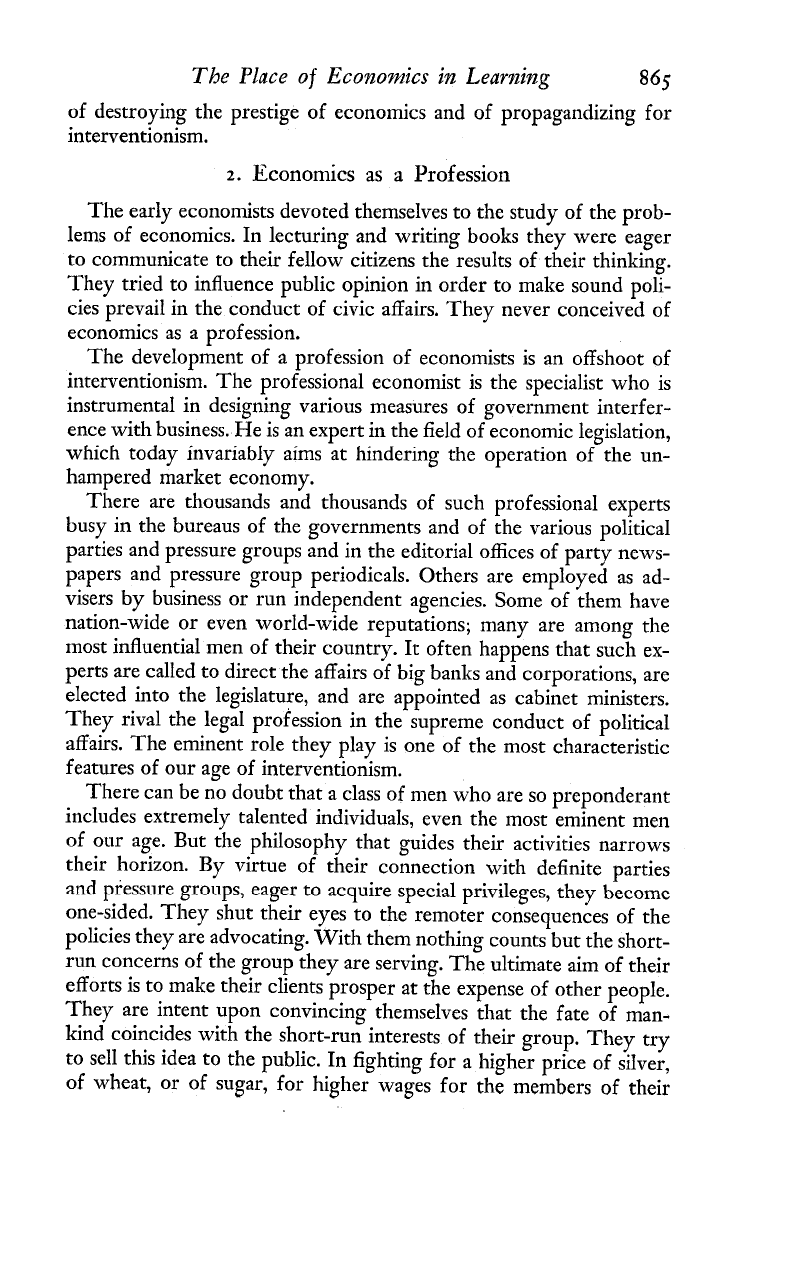
The Place of Economics
in
Learning
865
of destroying the prestige of economics and of propagandizing for
interventionism.
2.
Economics as
a
Profession
The early economists devoted themselves to the study of the prob-
lems of economics. In lecturing and writing books they were eager
to communicate to their fellow citizens the results of their thinking.
They tried to influence public opinion in order to make sound poli-
cies prevail in the conduct of civic affairs. They never conceived of
economics as a profession.
The development of a profession of economists is an offshoot of
interventionism. The professional economist is the specialist who is
instrumental in designing various measures of government interfer-
ence with business. He is an expert in the field of economic legislation,
which today invariably aims at hindering the operation of the un-
hampered market economy.
There are thousands and thousands of such professional experts
busy in the bureaus of the governments and of the various political
parties and pressure groups and in the editorial offices of party news-
papers and pressure group periodicals. Others are employed as ad-
visers by business or run independent agencies. Some of them have
nation-wide or even world-wide reputations; many are among the
most influential men of their country. It often happens that such ex-
perts are called to direct the affairs of big banks and corporations, are
elected into the legislature, and are appointed as cabinet ministers.
They rival the legal profession in the supreme conduct of political
affairs. The eminent role they play is one of the most characteristic
features of our age of interventionism.
There can be no doubt that a class of men who are so preponderant
includes extremely talented individuals, even the most eminent men
of our age. But the philosophy that guides their activities narrows
their horizon. By virtue of their connection with definite parties
and
nress~re
groupsi eager
to
acq~ir~
~n~rigl
privileges,
the..
became
I
-
--
-
-r---
Y
one-sided. They shut their eyes to the remoter consequences of the
policies they are advocating. With them nothing counts but the short-
run concerns of the group they are serving. The ultimate aim of their
efforts is to make their clients prosper at the expense of other people.
They are intent upon convincing themselves that the fate of man-
kind coincides with the short-run interests of their group. They try
to sell this idea to the public. In fighting for a higher price of silver,
of wheat, or of sugar, for higher wages for the members of their
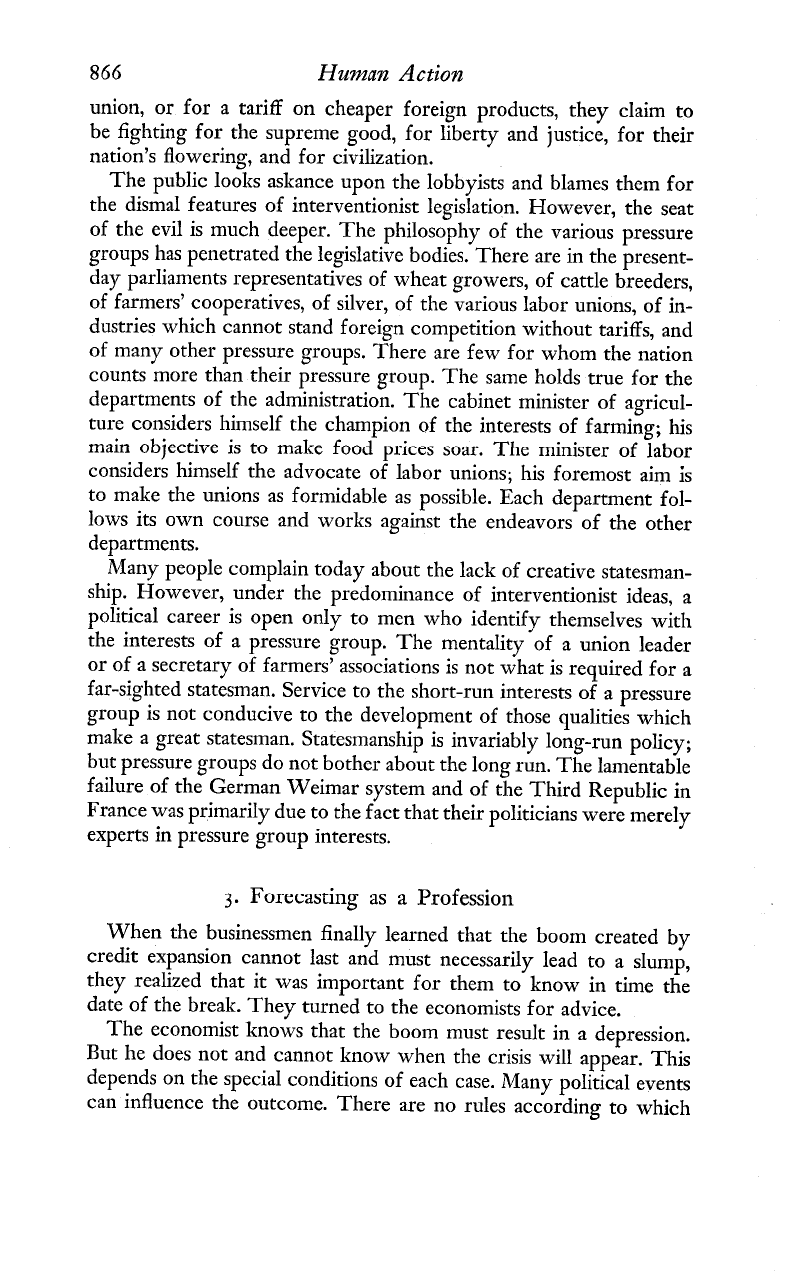
866
Human
Action
union, or for a tariff on cheaper foreign products, they claim to
be fighting for the supreme good, for liberty and justice, for their
nation's flowering, and for civilization.
The public looks askance upon the lobbyists and blames them for
the dismal features of interventionist legislation. However, the seat
of the evil is much deeper. The philosophy of the various pressure
groups has penetrated the legislative bodies. There are in the present-
day parliaments representatives of wheat growers, of cattle breeders,
of farmers' cooperatives, of silver, of the various labor unions, of in-
dustries which cannot stand foreign competition without tariffs, and
of many other pressure groups. There are few for whom the nation
counts more than their pressure group. The same holds true for the
departments of the administration. The cabinet minister of agricul-
ture considers himself the champion of the interests of farming; his
main objective is to make food prices soar. The minister of labor
considers himself the advocate of labor unions; his foremost aim is
to make the unions as formidable as possible. Each department fol-
lows its own course and works against the endeavors of the other
departments.
Many people complain today about the lack of creative statesman-
ship. However, under the predominance of interventionist ideas, a
political career is open only to men who identify themselves with
the interests of a pressure group. The mentality of a union leader
or of a secretary of farmers' associations is not what is required for a
far-sighted statesman. Service to the short-run interests of a pressure
group is not conducive to the development of those qualities which
make
a
great statesman. Statesmanship is invariably long-run policy;
but pressure groups do not bother about the long run. The lamentable
failure of the German Weimar system and of the Third Republic in
France was primarily due to the fact that their politicians were merely
experts in pressure group interests.
l7
-
j.
r
orecasting as
a
Profession
When the businessmen finally learned that the boom created by
credit expansion cannot last and must necessarily Iead to a slump,
they realized that it was important for them to know in time the
date of the break. They turned to the economists for advice.
The economist knows that the boom must result in a depression.
But he does not and cannot know when the crisis will appear. This
depends on the special conditions of each case. Many political events
can influence the outcome. There are no rules according to which
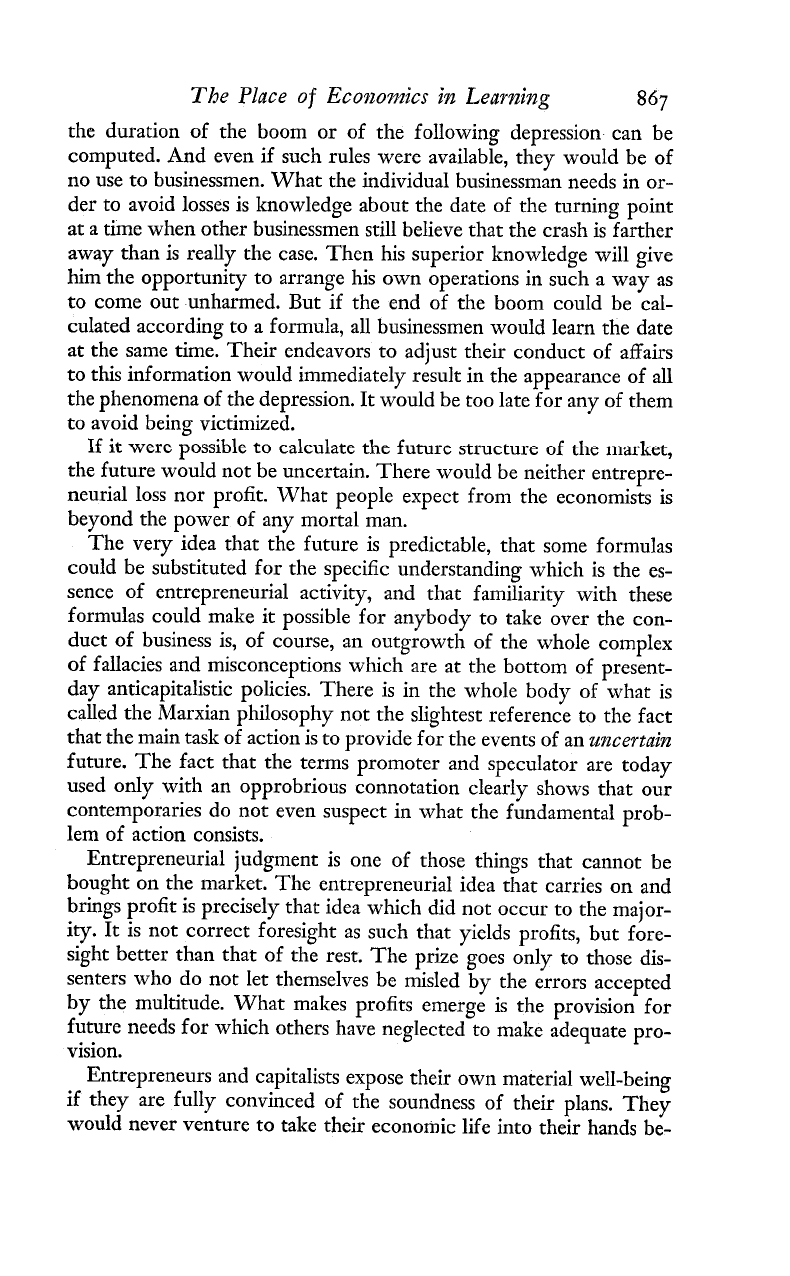
The
Place of Economics
in
Learning
g67
the duration of the boom or of the following depression can be
computed. And even if such rules were available, they would be of
no use to businessmen. What the individual businessman needs in or-
der to avoid losses is knowledge about the date of the turning point
at a time when other businessmen still believe that the crash is farther
away than is really the case. Then his superior knowledge will give
him the opportunity to arrange his own operations in such a way as
ro come out unharmed. But if the end of the boom could be cal-
culated according to a formula, all businessmen would learn the date
at the same time. Their endeavors to adjust their conduct of affairs
to this information would immediately result in the appearance of all
the phenomena of the depression. It would be too late for any of them
to avoid being victimized.
If it were possible to calculate the future structure of the market,
the future would not be uncertain. There would be neither entrepre-
neurial loss nor profit. What people expect from the economists is
beyond the power of any mortal man.
The very idea that the future is predictable, that some formulas
could be substituted for the specific understanding which is the es-
sence of entrepreneurial activity, and that familiarity with these
formulas could make it possible for anybody to take over the con-
duct of business is, of course, an outgrowth of the whole complex
of fallacies and misconceptions which are at the bottom of present-
day anticapitalistic policies. There is in the whole body of what is
called the Marxian philosophy not the slightest reference to the fact
that the main task of action is to provide for the events of an
uncertain
future. The fact that the terms promoter and speculator are today
used only with an opprobrious connotation clearly shows that our
contemporaries do not even suspect in what the fundamental prob-
lem of action consists.
Entrepreneurial judgment is one of those things that cannot be
bought on the market. The entrepreneurial idea that carries on and
brings profit is precisely that ideawhich did not occur to the major-
ity.
It is not correct foresight as such that yields profits, but fore-
sight better than that of the rest. The prize goes only to those dis-
senters who do not let themselves be misled by the errors accepted
by the multitude. What makes profits emerge is the provision for
future needs for which others have neglected to make adequate pro-
vision.
Entrepreneurs and capitalists expose their own material well-being
if they are fully convinced of the soundness of their plans. They
would never venture to take their economic life into their hands be-
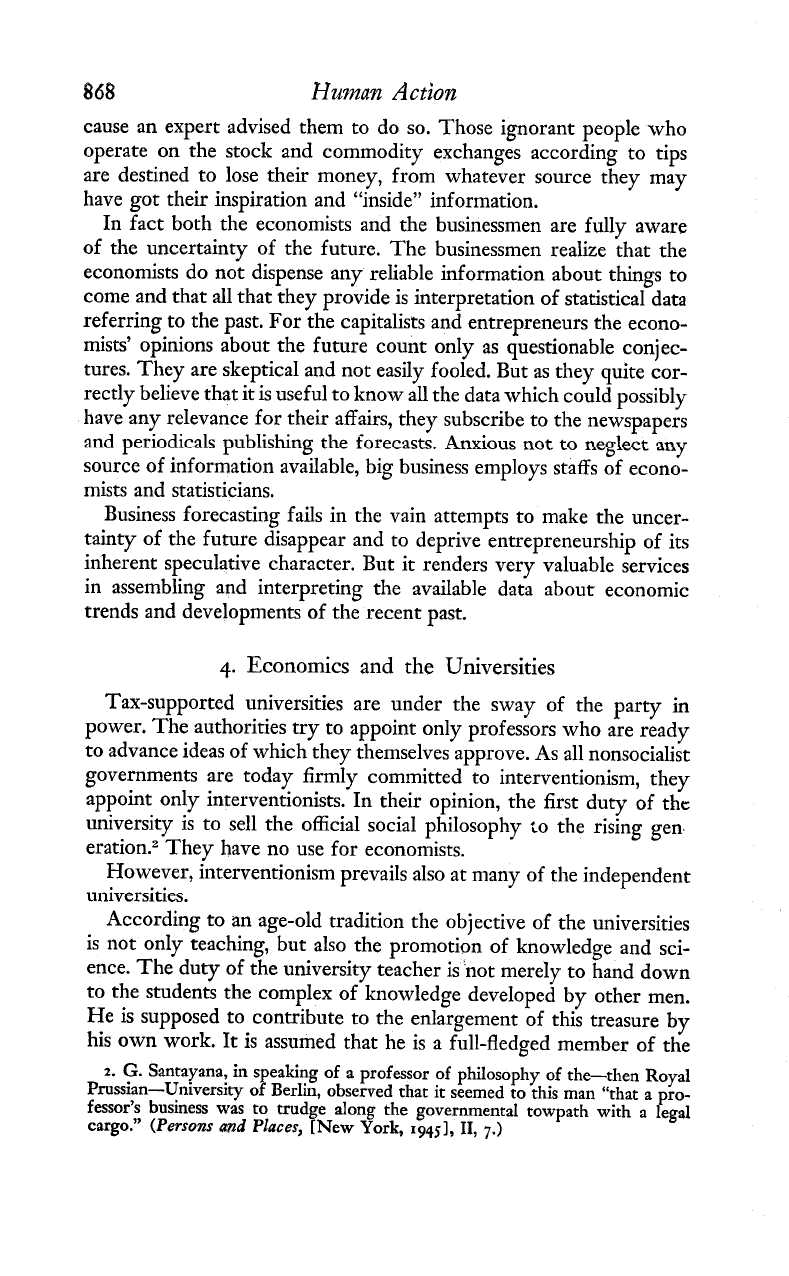
868
Human
Action
cause an expert advised them to do so. Those ignorant people who
operate on the stock and commodity exchanges according to tips
are destined to lose their money, from whatever source they may
have got their inspiration and "inside" information.
In fact both the economists and the businessmen are fully aware
of the uncertainty of the future. The businessmen realize that the
economists do not dispense any reliable information about things to
come and that all that they provide is interpretation of statistical data
referring to the past. For the capitalists and entrepreneurs the econo-
mists' opinions about the future count only as questionable conjec-
tures. They are skeptical and not easily fooled. But as they quite cor-
rectly believe that it is useful to know all the data which could possibly
have any relevance for their affairs, they subscribe to the newspapers
and periodicals publishing the forecasts. Anxious not to neglect any
source of information available, big business employs staffs of econo-
mists and statisticians.
Business forecasting fails in the vain attempts to make the uncer-
tainty of the future disappear and to deprive entrepreneurship of its
inherent speculative character. But it renders very valuable services
in assembling and interpreting the available data about economic
trends and developments of the recent past.
4.
Economics and the Universities
Tax-supported universities are under the sway of the party in
power. The authorities try to appoint only professors who are ready
to advance ideas of which they themselves approve. As all nonsocialist
governments are today firmly committed to interventionism, they
appoint only interventionists. In their opinion, the first duty of
the
university is to sell the official social philosophy to the rising gen
erati~n.~ They have no use for economists.
However, interventionism prevails also at many of the independent
.
..
U11IVGl
SlLlCb.
According to an age-old tradition the objective of the universities
is not only teaching, but also the promotion of knowledge and sci-
ence. The duty of the university teacher is not merely to hand down
to the students the complex of knowledge developed by other men.
He is supposed to contribute to the enlargement of this treasure by
his own work. It is assumed that he is a full-fledged member of the
2.
G.
Santayana,
in
speaking of a professor of philosophy of the-then Royal
Pmssian-University of Berlin, observed that it seemed to this man "that a pro-
fessor's business was to trudge along the governmental towpath with a legal
cargo."
(Persons
and
Places,
[New York, 19451~11,
7.)
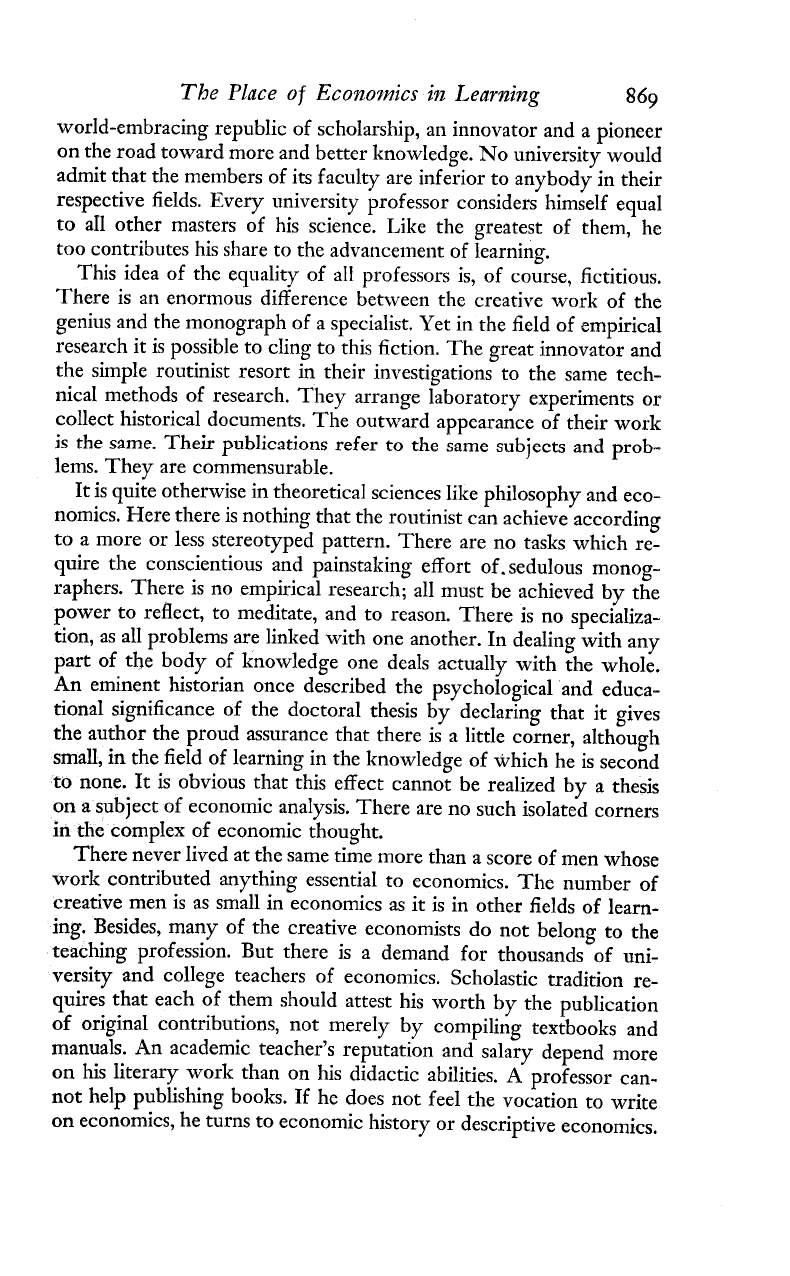
The
Place
of
Economics
in Learning
world-embracing republic of scholarship, an innovator and a pioneer
on the road toward more and better knowledge. No university would
admit that the members of its faculty are inferior to anybody in their
respective fields. Every university professor considers himself equal
to a11 other masters of his science. Like the greatest of them, he
too contributes his share to the advancement of learning.
This idea of the equality of all professors is, of course, fictitious.
There is an enormous difference between the creative work of the
genius and the monograph of a specialist. Yet in the field of empirical
research it is possible to cling to this fiction. The great innovator and
the simple routinist resort in their investigations to the same tech-
nical methods of research. They arrange laboratory experiments or
collect historical documents. The outward appearance of their work
is the same. Their publications refer to the same subjects and prob-
lems. They are commensurable.
It is quite otherwise in theoretical sciences like philosophy and eco-
nomics. Here there is nothing that the routinist can achieve according
to a more or less stereotyped pattern. There are no tasks which re-
quire the conscientious and painstaking effort of. sedulous monog-
raphers. There is no empirical research; all must be achieved by the
power to reflect, to meditate, and to reason. There is no specializa-
tion, as all problems are linked with one another. In dealing with any
part of the body of knowledge one deals actually with the whole.
An eminent historian once described the psychological and educa-
tional significance of the doctoral thesis by declaring that it gives
the author the proud assurance that there is a little corner, although
small, in the field of learning in the knowledge of which he is second
to none. It is obvious that this effect cannot be realized by
a
thesis
on
a
subject of economic analysis. There are no such isolated corners
in the complex of economic thought.
There never lived at the same time more than a score of men whose
work contributed anything essential to economics. The number of
creative men is as small in economics as it is in other fields of learn-
ing. Besides, many of the creative economists do not belong to the
teaching profession. But there is a demand for thousands of uni-
versity and college teachers of economics. Scholastic tradition re-
quires that each of them should attest his worth by the publication
of original contributions, not merely by compiling textbooks and
manuals. An academic teacher's reputation and salary depend more
on his literary work than on his didactic abilities.
A
professor can-
not help publishing books. If he does not feel the vocation to write
on economics, he turns to economic history or descriptive economics.
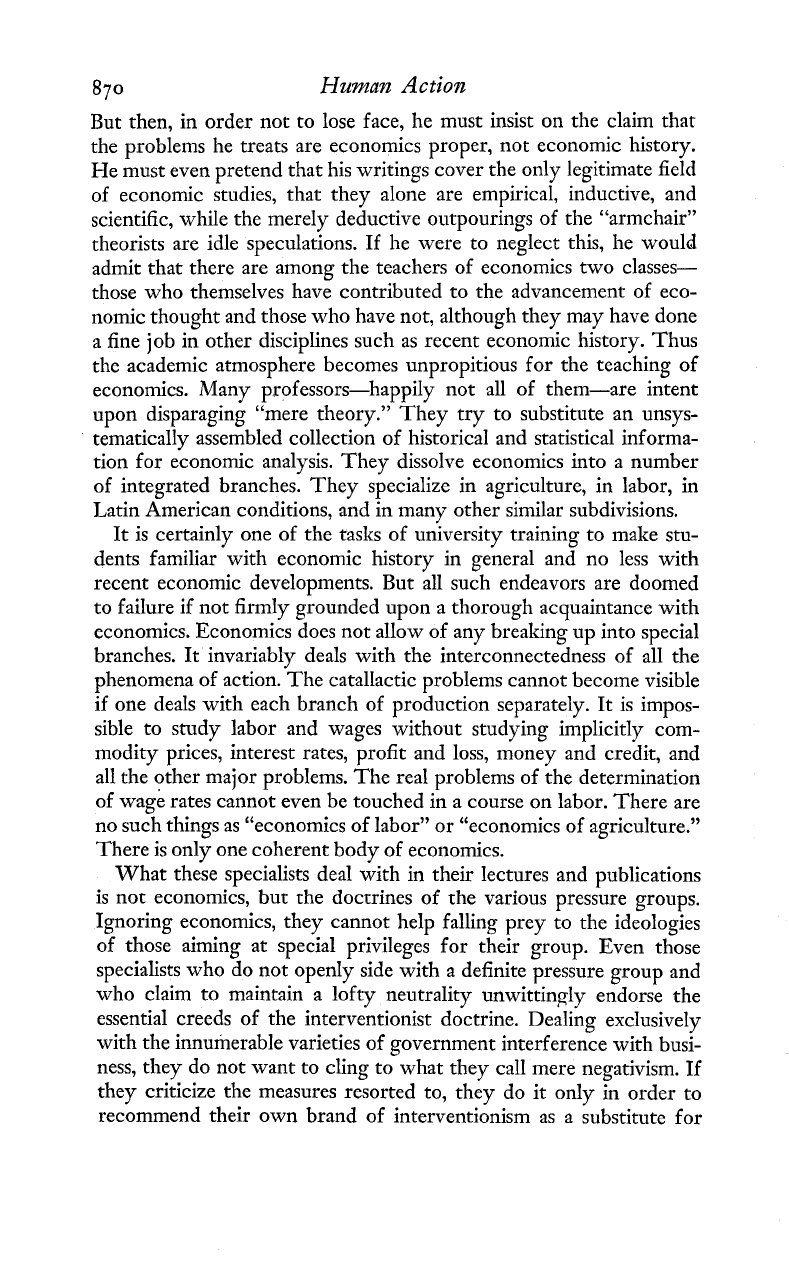
870
Human
Action
But then, in order not to lose face, he must insist on the claim that
the problems he treats are economics proper, not economic history.
He must even pretend that his writings cover the only legitimate field
of economic studies, that they alone are empirical, inductive, and
scientific, while the merely deductive outpourings of the "armchair"
theorists are idle speculations. If he were to neglect this, he would
admit that there are among the teachers of economics two classes-
those who themselves have contributed to the advancement of eco-
nomic thought and those who have not, although they may have done
a fine job in other disciplines such as recent economic history. Thus
the academic atmosphere becomes unpropitious for the teaching of
economics. Many professors-happily not all of them-are intent
upon disparaging "mere theory." They try to substitute an unsys-
tematically assembled collection of historical and statistical informa-
tion for economic analysis. They dissolve economics into a number
of integrated branches. They specialize in agriculture, in labor, in
Latin American conditions, and in many other similar subdivisions.
It is certainly one of the tasks of university training to make stu-
dents familiar with economic history in general and no less with
recent economic developments. But all such endeavors are doomed
to failure if not firmly grounded upon a thorough acquaintance with
economics. Economics does not allow of any breaking up into special
branches. It invariably deals with the interconnectedness of all the
phenomena of action. The catallactic problems cannot become visible
if one deals with each branch of production separately. It is impos-
sible to study labor and wages without studying implicitly com-
modity prices, interest rates, profit and loss, money and credit, and
all the other major problems. The real problems of the determination
of wage rates cannot even be touched in a course on labor. There are
no such things as "economics of labor" or "economics of agriculture."
There is only one coherent body of economics.
What these specialists deal with in their lectures and publications
is noc economics, but the doctrines of the various pressure groups.
Ignoring economics, they cannot help falling prey to the ideologies
of those aiming at special privileges for their group. Even those
specialists who do not openIy side with a definite pressure group and
who claim to maintain a lofty neutrality unwittingly endorse the
essential creeds of the interventionist doctrine. Dealing exclusively
with the innumerable varieties of government interference with busi-
ness, they do not want to cling to what they call mere negativism.
If
they criticize the measures resorted to, they do it only in order to
recommend their own brand of interventionism as a substitute for
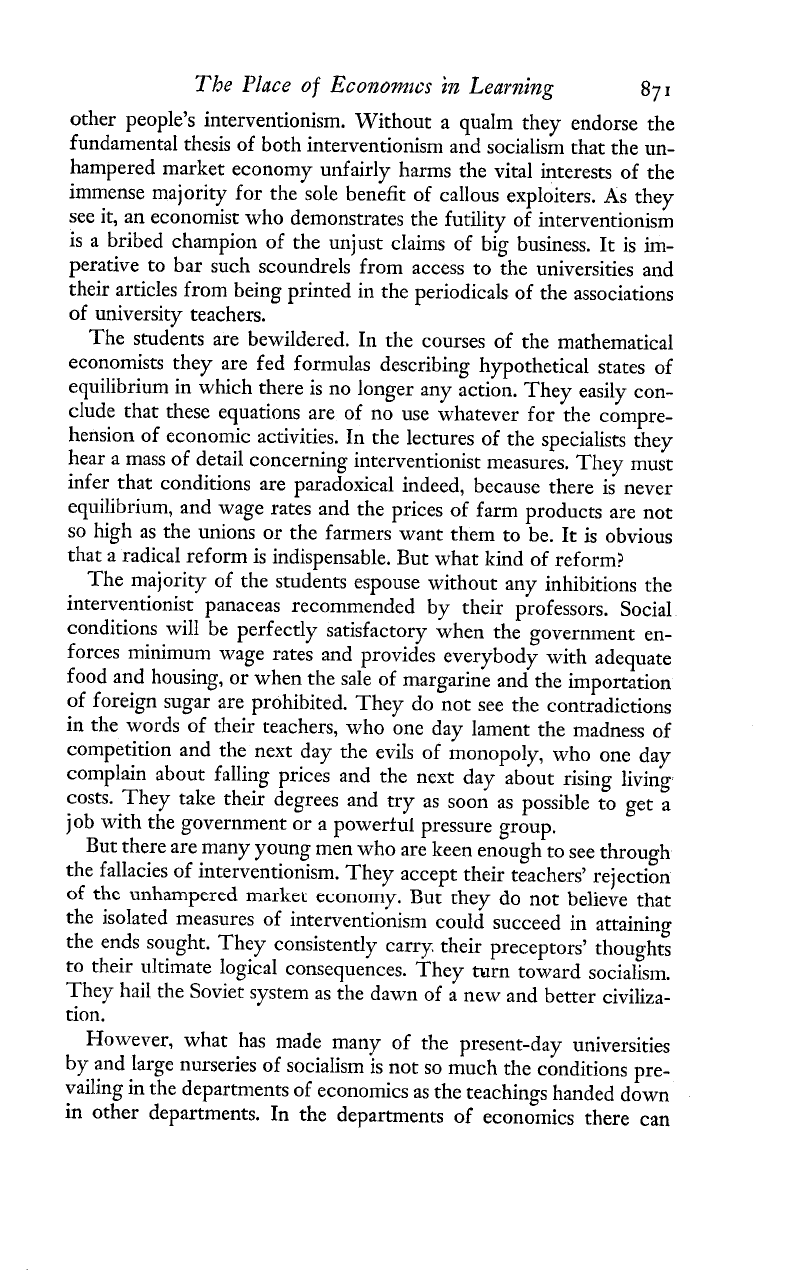
The Place of Economcs
in
Learning
871
other people's interventionism. Without a qualm they endorse the
fundamental thesis of both interventionism and socialism that the un-
hampered market economy unfairly harms the vital interests of the
immense majority for the sole benefit of callous exploiters. As they
see
it,
an economist who demonstrates the futility of interventionism
is a bribed champion of the unjust claims of big business. It is im-
perative to bar such scoundrels from access to the universities and
their articles from being printed in the periodicals of the associations
of university teachers.
The students are bewildered. In the courses of the mathematical
economists they are fed formulas describing hypothetical states of
equilibrium in which there is no longer any action. They easily con-
clude that these equations are of no use whatever for the compre-
hension of economic activities. In the lectures of the specialists they
hear
a
mass of detail concerning interventionist measures. They must
infer that conditions are paradoxical indeed, because there is never
equilibrium, and wage rates and the prices of farm products are not
so high as the unions or the farmers want them to be. It is obvious
that a radical reform is indispensable. But what kind of reform?
The majority of the students espouse without any inhibitions the
interventionist panaceas recommended by their professors. Social
conditions will be perfectly satisfactory when the government en-
forces minimum wage rates and provides everybody with adequate
food and housing, or when the sale of margarine and the importation
of foreign sugar are prohibited. They do not see the contradictions
in the words of their teachers, who one day lament the madness of
competition and the next day the evils of monopoly, who one day
complain about falling prices and the next day about rising living
costs. They take their degrees and try as soon as possible to get a
job with the government or a powerful pressure group.
But: there are many young men who are keen enough to see through
the fallacies of interventionism. They accept their teachers' rejection
of
thc
niihampereb
market economy. Bur they do not beiieve that
the isolated measures of interventionism could succeed in attaining
the ends sought. They consistently carry. their preceptors' thoughts
to their ultimate logical consequences. They turn toward socialism.
They hail the Soviet system as the dawn of a new and better civiliza-
tion.
However, what has made many of the present-day universities
by and large nurseries of socialism is not so much the conditions pre-
vailing in the departments of economics as the teachings handed down
in other departments. In the departments of economics there can
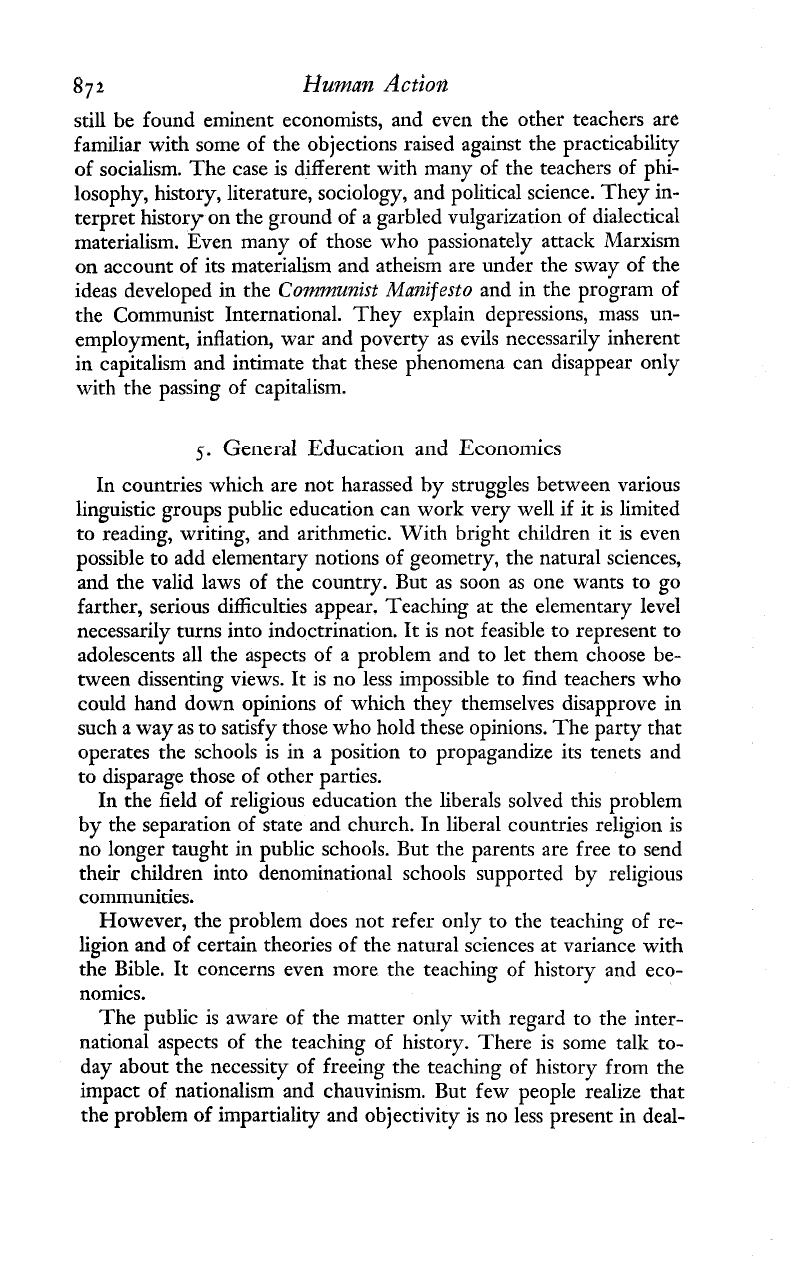
872
Human
Action
still be found eminent economists, and even the other teachers are
familiar with some of the objections raised against the practicability
of socialism. The case is different with many of the teachers of phi-
losophy, history, literature, sociology, and political science. They in-
terpret history on the ground of a garbled vulgarization of dialectical
materialism. Even many of those who passionately attack Marxism
on account of its materialism and atheism are under the sway of the
ideas developed in the
Communist Manifesto
and in the program of
the Communist International. They explain depressions, mass un-
employment, inflation, war and poverty as evils necessarily inherent
in capitalism and intimate that these phenomena can disappear only
with the passing of capitalism.
5.
General Education and Economics
In countries which are not harassed by struggles between various
linguistic groups public education can work very well if it is limited
to reading, writing, and arithmetic. With bright children it is even
possible to add elementary notions of geometry, the natural sciences,
and the valid laws of the country. But as soon as one wants to go
farther, serious difficulties appear. Teaching at the elementary level
necessarily turns into indoctrination. It is not feasible to represent to
adolescents all the aspects of a problem and to let them choose be-
tween dissenting views. It is no less impossible to find teachers who
could hand down opinions of which they themselves disapprove in
such
a
way as to satisfy those who hold these opinions. The party that
operates the schools is in a position to propagandize its tenets and
to disparage those of other parties.
In
the field of religious education the liberals solved this problem
by the separation of state and church. In liberal countries religion is
no longer taught in public schools. But the parents are free to send
their children into denominational schools supported by religious
communities.
However, the problem does not refer only to the teaching of re-
ligion and of certain theories of the natural sciences at variance with
the Bible. It concerns even more the teaching of history and eco-
nomics.
The public is aware of the matter only with regard to the inter-
national aspects of the teaching of history. There is some talk to-
day about the necessity of freeing the teaching of history from the
impact of nationalism and chauvinism. But few people realize that
the problem of impartiality and objectivity is no less present in deal-
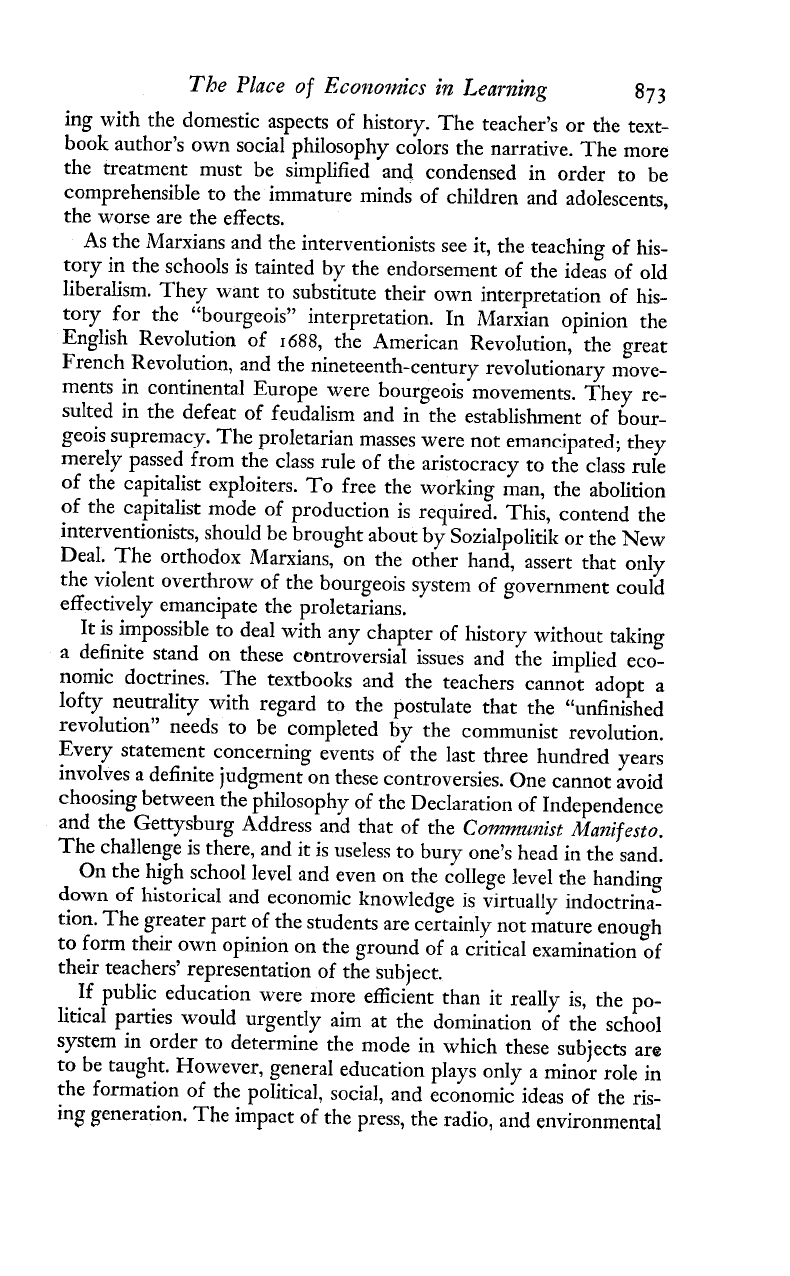
The
Place
of
Economics
in
Learning
ing with the domestic aspects of history. The teacher's or the text-
book author's own social philosophy colors the narrative. The more
the treatment must be simplified and condensed in order to be
comprehensible to the immature minds of children and adolescents,
the worse are the effects.
As the Marxians and the interventionists see it, the teaching of his-
tory in the schools is tainted by the endorsement of the ideas of old
liberalism. They want to substitute their own interpretation of his-
tory for the "bourgeois" interpretation. In Marxian opinion the
English Revolution of
1688,
the American Revolution, the great
French Revolution, and the nineteenth-century revolutionary move-
ments in continental Europe were bourgeois movements. They re-
sulted in the defeat of feudalism and in the establishment of bour-
geois supremacy. The proletarian masses were not emancipated; they
merely passed from the class rule of the aristocracy to the class rule
of the capitalist exploiters. To free the working man, the abolition
of the capitalist mode of production is required. This, contend the
interventionists, should be brought about by Sozialpolitik or the New
Deal. The orthodox Marxians, on the other hand, assert that only
the violent overthrow of the bourgeois system of government could
effectively emancipate the proletarians.
It is impossible to deal with any chapter of history without taking
a
definite stand on these controversial issues and the implied eco-
nomic doctrines. The textbooks and the teachers cannot adopt a
lofty neutrality with regard to the postulate that the "unfinished
revolution" needs to be completed by the communist revolution.
Every statement concerning events of the last three hundred years
involves
a
definite judgment on these controversies. One cannot avoid
choosing between the philosophy
of
the Declaration
of
Independence
and the Gettysburg Address and that of the
Conzmunist Manifesto.
The challenge is there, and it is useless to bury one's head in the sand.
On the high school level and even on the college level the handing
d~wii
of
historical
and economic knowiedge is virtually indoctrina-
tion. The greater part of the students are certainly not mature enough
to form their own opinion on the ground of a critical examination of
their teachers' representation of the subject.
If public education were more efficient than it really is, the po-
litical parties would urgently aim at the domination of the school
system in order to determine the mode in which these subjects are
to be taught. However, general education plays only a minor role in
the formation of the political, social, and economic ideas of the ris-
ing generation. The impact of the press, the radio, and environmental
